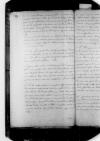List #5743
Alfonso de VALDÉS do Ioannes DANTISCUSs.l., [a few days after 1528-10-12]
Regest polski: Valdes cieszy się, że Dantyszek przyjechał bezpiecznie. Kanclerz [Mercurino Gattinara] zatrzymał się tutaj, ponieważ nie podobała mu się kwatera w Pínto. Kanclerz ma się lepiej. Dantyszek będzie u niego zawsze mile widziany. Valdes zaprasza Dantyszka na jutro na obiad, jeśli Dantyszek nie zdoła przyjść, Valdes postara się go potem odwiedzić. Cieszą go dary Dantyszka, może jednak poczekać na nie do jego wyjazdu. Mówi się, iż po zwycięstwie wojsk cesarskich [nad armia i flotą francuską koło Neapolu] posłani zostali do papieża po pieniądze dwaj posłowie — Niemiec i Hiszpan.
Rękopiśmienne podstawy źródłowe:
Pomocnicze podstawy źródłowe:
Publikacje:
| ||||||||||||||||||||
Tekst + aparat krytyczny + komentarzZwykły tekstTekst + komentarzTekst + aparat krytyczny
Salutem.
Te salvum advenisse vehementer gaudeo.
ms 1 2 Quandocumque
⌈Quando umquam
print 1 Quando umquam
,
ms 1 2 Quandocumque
⌉ ad
ms 1 2 poteras⌈potesprint 1 potes,
ms 1 2 poteras⌉ ea ad discessum usque tuum servare. Vale.
print 1 Tuus Valdesius,
ms 1 2 omitted⌈Tuus
ms 1 2 omitted⌉
Postscript:
Audivimus exercitum caesareum post adeptam
victoriam[2] duos oratores, Germanum
alterum, alterum Hispanum ad
ms 1 2 pecunias⌈pecuniamprint 1 pecuniam,
ms 1 2 pecunias⌉ extorqueant.
cf. Sen. Con. 1. 1. 17. 9 O graves, Fortuna vices tuas; Dantisci Carmina I 3, l. 5-6 Fortunae anfractus varios et flabra notabam / Nubila, multiplices mutat ut illa vices; Dantisci Carmina I 3, l. 483 Sic variat Fortuna vices ⌊Sic mutat fortuna vicescf. Sen. Con. 1. 1. 17. 9 O graves, Fortuna vices tuas; Dantisci Carmina I 3, l. 5-6 Fortunae anfractus varios et flabra notabam / Nubila, multiplices mutat ut illa vices; Dantisci Carmina I 3, l. 483 Sic variat Fortuna vices ⌋
[1] Apud divum Hieronymum could mean “like in a royal residence”.
[2] Victoria – perhaps the capture of Milan (1526-07-24) at the beginning of the conflict between Charles V and the League of Cognac, or any subsequent minor success of the imperial troops in Italy. Identities of the mentioned envoys of the imperial army are not known, the Spanish one could be

 BK 222, No. 47, p. 187
BK 222, No. 47, p. 187